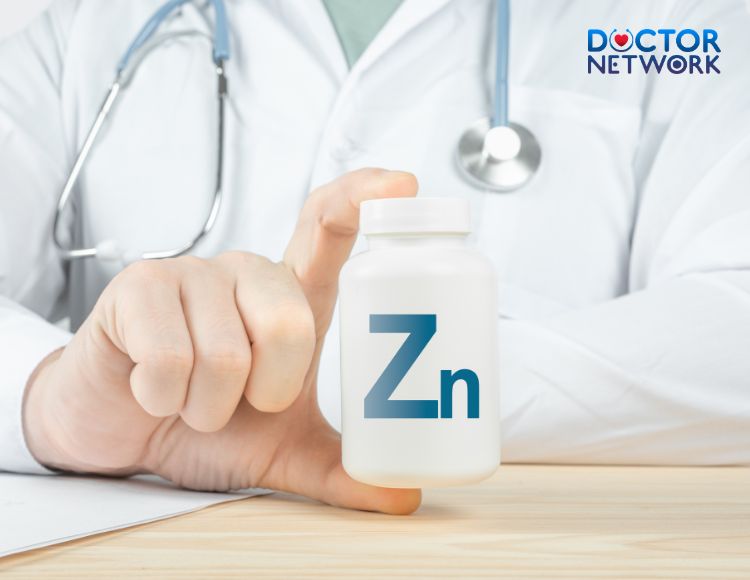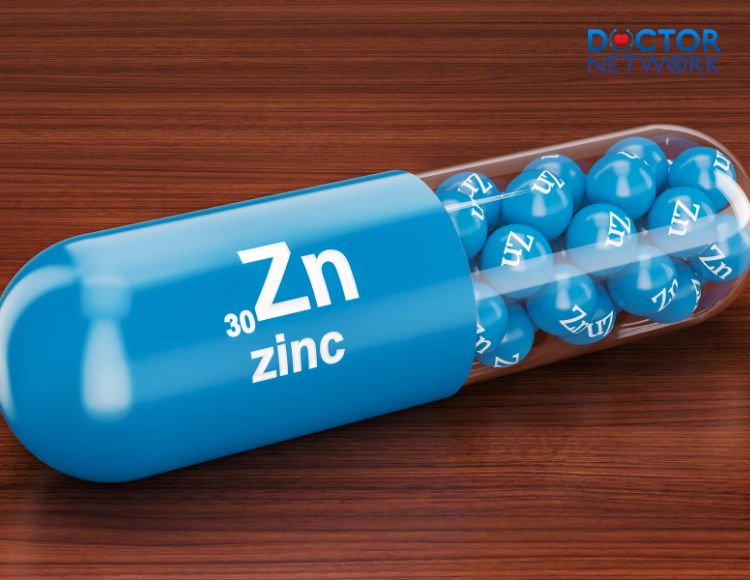What is the perfect time to consume Zinc Supplementation? Zinc, a powerhouse micronutrient, is crucial in numerous bodily functions, from bolstering your immune system to promoting cognitive health. But when it comes to supplementation, timing can be everything. This comprehensive guide delves into the optimal moments for zinc intake, exploring the morning vs. evening debate, and providing expert insights to help you maximize the benefits of this essential mineral.
The Zinc Advantage: Understanding Its Vital Role
Before we dive into timing, let’s explore why zinc is a cornerstone of good health:
| Function | Benefit |
|---|---|
| Immune Support | Strengthens defenses against pathogens |
| Cellular Health | Promotes growth, repair, and regeneration |
| Cognitive Function | Supports brain health and mental acuity |
| Sensory Perception | Maintains healthy taste and olfactory senses |
| Wound Healing | Accelerates recovery from injuries |

Zinc is a versatile trace mineral that plays a key role in many biological processes in the body.
Morning Zinc: Energize Your Day
Taking zinc in the morning can offer several advantages:
- Immune System Boost: Jumpstart your body’s natural defenses.
- Enhanced Alertness: Support cognitive function throughout the day.
- Metabolic Kickstart: Aid in nutrient metabolism for sustained energy.

Taking zinc in the morning can offer several advantages
Evening Zinc: Optimize Rest and Recovery
Alternatively, evening supplementation has its own set of benefits:
- Improved Sleep Quality: Zinc may help regulate sleep cycles.
- Enhanced Digestion: Support nutrient absorption during overnight fasting.
- Cellular Repair: Aid nighttime regeneration processes.
Factors Influencing Zinc Absorption
Consider these elements when deciding on your supplementation schedule:
- Dietary Habits: Your meal timing can affect zinc uptake.
- Health Conditions: Certain issues may influence absorption rates.
- Medication Interactions: Some drugs can interfere with zinc utilization.
Optimizing Your Zinc Routine: Expert Tips
To maximize the benefits of zinc supplementation, consider the following strategies:
- Pair with Vitamin C: Enhance absorption by combining with vitamin C-rich foods.
- Avoid Calcium-Rich Foods: These can inhibit zinc absorption when taken simultaneously.
- Stay Consistent: Regular supplementation yields better results than sporadic intake.
Zinc-Rich Foods: Natural Sources to Consider
Incorporate these zinc powerhouses into your diet:
| Food | Zinc Content (per 100g) |
|---|---|
| Oysters | 78.6 mg |
| Beef | 12.3 mg |
| Pumpkin Seeds | 7.8 mg |
| Lentils | 3.0 mg |
| Dark Chocolate | 3.3 mg |
The Verdict: Personalizing Your Zinc Schedule
Ultimately, the best time to take zinc depends on your individual needs and lifestyle. Here’s a quick guide to help you decide:
- Morning Supplementation: Ideal for those seeking an immune and energy boost.
- Evening Supplementation: Beneficial for individuals prioritizing sleep quality and recovery.
- Split Dosage: Some may benefit from dividing their zinc intake between morning and evening. Remember, consistency is key. Whichever schedule you choose, stick to it for optimal results.

The best time to take zinc depends on your individual needs and lifestyle
Scientific Research
- “Zinc in Human Health: Effect of Zinc on Immune Cells” (Prasad, 2008)
- While this doesn’t directly address timing, it provides crucial background on zinc’s role in immune function, which can inform timing decisions.
- “The Role of Zinc in Sleep and Circadian Regulation” (Cherasse & Urade, 2017)
- This review discusses zinc’s impact on sleep, which could support evening supplementation for some individuals.
- “Zinc Status and Sleep Quality in Iranian Elderly: A Systematic Review and Meta-analysis of Observational Studies” (Gholami et al., 2022)
- Another study linking zinc to sleep quality, potentially relevant for evening supplementation considerations.
- “Effect of Zinc Supplementation on Serum Testosterone Level in Adult Male Sickle Cell Anemia Subjects” (Prasad et al., 1981)
- This study found morning zinc supplementation affected testosterone levels, which could be relevant for timing decisions in certain populations.
- “Zinc absorption in human subjects from a mixed meal: Effect of different amounts of dietary calcium” (Dawson-Hughes et al., 1986)
- While not directly about timing, this study highlights how other nutrients (like calcium) can affect zinc absorption, which is crucial when considering supplementation timing.
Frequently Asked Questions On “What is the perfect time to consume Zinc Supplementation”
Here are 5 frequently asked questions about “Zinc Supplementation Timing”:
1. What are the benefits of taking zinc in the morning?
Taking zinc in the morning has many benefits:
– Strengthens the immune system to protect the body throughout the day
– Improves metabolism, helps the body stay alert and full of energy
– Supports protein synthesis, important for cell growth and repair
– Optimizes enzyme function, improves work and study performance
2. Does taking zinc in the evening cause insomnia?
Taking zinc in the evening usually does not cause insomnia. On the contrary, zinc can support sleep:
– Zinc is involved in the production of melatonin – the hormone that regulates the sleep-wake cycle
– Combined with magnesium, zinc can improve sleep quality
– Helps balance levels of GABA, a neurotransmitter that has a relaxing effect
However, if you are sensitive, take zinc at least 2-3 hours before bedtime.
3. Should you take zinc with vitamin C?
Taking zinc with vitamin C (Ascorbic acid) is an effective combination:
– Vitamin C helps increase zinc absorption
– Both are powerful antioxidants, complementing each other in protecting cells
– This combination is especially useful for the immune system
– However, do not exceed the recommended dosage of either substance
4. Is it better to take zinc on an empty stomach or full stomach?
Taking zinc on an empty stomach is often recommended:
– Helps the body absorb zinc better
– Avoids interactions with substances in food that can affect absorption
However, if you feel uncomfortable taking zinc on an empty stomach, you can take it after a light meal. Avoid taking it at the same time as foods rich in calcium or fiber.
5. What is the appropriate daily dose of zinc?
The dose of zinc depends on age, gender and health status:
– Adult men: 11mg/day
– Adult women: 8mg/day
– Pregnant women: 11mg/day
– Elderly people (over 70 years old): 11mg (men), 8mg (women) per day
Note: do not exceed 40mg/day to avoid side effects. Always consult a doctor or nutritionist to determine the appropriate dose for your body.
Conclusion: Empowering Your Health with Informed Choices
By understanding the nuances of zinc timing, you’re taking a proactive step towards optimizing your health. Whether you’re an early bird or a night owl, there’s a zinc supplementation strategy that can work for you. Always consult with a healthcare professional before starting any new supplement regimen to ensure it aligns with your unique health profile and goals.
With this knowledge at your fingertips, you’re well-equipped to harness the full potential of zinc supplementation. Here’s to your health!
References
https://www.goodhousekeeping.com/health/a46128798/best-time-to-take-zinc/
https://www.vinmec.com/eng/article/note-do-not-take-zinc-and-iron-at-the-same-time-en
https://www.prevention.com/health/a46446375/best-time-to-take-zinc/
Kiểm Duyệt Nội Dung
More than 10 years of marketing communications experience in the medical and health field.
Successfully deployed marketing communication activities, content development and social networking channels for hospital partners, clinics, doctors and medical professionals across the country.
More than 6 years of experience in organizing and producing leading prestigious medical programs in Vietnam, in collaboration with Ho Chi Minh City Television (HTV). Typical programs include Nhật Ký Blouse Trắng, Bác Sĩ Nói Gì, Alo Bác Sĩ Nghe, Nhật Ký Hạnh Phúc, Vui Khỏe Cùng Con, Bác Sỹ Mẹ, v.v.
Comprehensive cooperation with hundreds of hospitals and clinics, thousands of doctors and medical experts to join hands in building a medical content and service platform on the Doctor Network application.


























